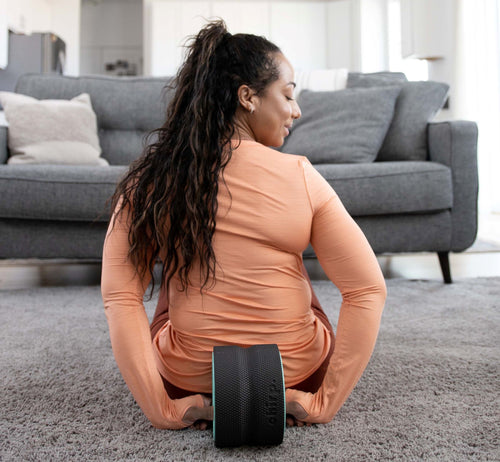The Question: My back pain is keeping me awake at night—Why? And, How do I fix it?
The Simple Answer: The main cause for nightly back pain is poor posture. As the day progresses, your spine and back naturally begin to slouch and compress. If you spend a lot of the day sitting, you may be especially susceptible to back pain at night. To fix your nighttime back pain, try changing sleep positions, stretching your back muscles before bed, or sticking to a sleep schedule.
When the day is done, there is nothing that sounds better than crawling into the warm embrace of your bed and falling asleep. After some good ‘ole shut-eye, we look forward to and expect to awake feeling refreshed and ready to take on whatever the day throws at us.
Unfortunately, as soon as your head hits the pillow, your back begins to scream at you over all the aches and pains it's been experiencing. You’re stuck awake, staring at your ceiling, tossing and turning for a comfortable, pain-relieving position, and longing for the sleep that will never come thanks to persistent back pain.
When it comes to back pain, it’s estimated that 80% of people experience some form of back pain throughout their lives. Out of those people, 33% report back pain interfering with their ability to sleep.
As unfortunate as it may be to hear, the lack of sleep caused by your back pain may also be making your back pain worse. Sleep is a very important part of our body’s daily schedule, and all of its internal functions begin to throw that same toddler-like fit if you’re not catching enough Zs. The goal is to minimize your back pain and achieve healthy sleep.
So, what exactly qualifies as enough sleep? Healthy sleep means you
- Fall asleep within 15 minutes of lying down
- Sleep 7 to 9 hours every 24 hour period
- Sleep continuously without waking up multiple times during the night
- Wake feeling refreshed, almost like you “reset” from the day before
- Feel alert and productive throughout the day
If the above description of a healthy sleeper does not sound like you, you could be suffering from a minor case of sleep deprivation. Without the necessary amounts of healthy sleep, you will start to notice long-term negative effects to your entire body, not just your back pain. Some of these negative effects include problems with memory, trouble regulating your weight, an increase in anxiety and depression, a weaker immune system, and an increase in pain sensations throughout your body. The pain you feel in your back is likely further aggravated by an increased inflammatory response caused by a lack of sleep.
If you’re experiencing sleep deprivation due to nightly back pain, here are 5 easy tips to help minimize your back pain and achieve healthy sleep:
1. Sleep Positions:
Believe it or not, the position you sleep in can have a major impact on your back pain. If you find that you can’t get comfortable at night because of your back pain, you should try adjusting how you sleep. Choosing a position that is comfortable for you but also healthy for your spine, can have a huge impact on helping you fall asleep and stay asleep.
Place a pillow between your knees
This position involves sleeping on your side with one to two pillows between your knees. The pillow between your knees helps keep your spine, hips, and legs in alignment, while the overall position minimizes pressure points. However, it’s important to alternate which side you choose to lie on because favoring one side can cause issues, such as muscle imbalance and scoliosis.
Curl up in a ball
Lie on your side and curl up in a ball, like you’re in the fetal position. Tuck your knees in towards your torso, stretching your spine and relieving pressure. Remember to alternate which side you choose to lie on to prevent balance issues.
Place a pillow for stomach sleepers
Sleeping on your stomach is probably the worst position for your back because your neck is forced to turn all night. In order to make this position a bit better for your back pain, place a pillow under your pelvis to maintain the natural curve of your spine.
Lift your knees
This is considered by some to be the best position for back pain relief. Lie on your back and gently prop your knees up using a pillow. Lying on your back with your knees raised helps evenly distribute your weight across the mattress. This allows for less strain and pressure along your back’s pressure points and maintains healthy alignment of your spine.
2. Exercise and Stretching:
As a preventative measure, one of the best things you can do for your overall spine health is to exercise regularly. Focusing on strength-building exercises for your core abdominal muscles will help protect your spine from injury, maintain healthy alignment, and lessen the pressure placed on your spine from day-to-day activities. However, it’s important to do these exercises early in the day. If you perform strenuous exercise too close to bedtime, you will have an even harder time falling asleep.
When your back pain is regularly worse in the evenings, you may benefit from a nightly stretching routine. The focus here is not exercise. Rather, you are looking to release tension within your spine and back muscles to allow for deeper relaxation and pain relief before you sleep. Combined with deep breathing exercises, you can try doing a few simple yoga poses to stretch your spine. Additionally, you can stretch your spine and work out muscle tension by using the Chirp Wheel+ for a relaxing massage before you sleep. And, finally, some studies have shown that following a Progressive Muscle Relaxation routine before bed can help lessen anxiety and pull you into a deeper, more relaxing sleep.
3. Routine:
If you are struggling to fall asleep at night, whether that be from back pain or another issue, you should look at how you’re getting ready for bed. Specifically, you should focus on maintaining a regular nighttime routine—this includes going to sleep and waking up at the same time every day. When determining what time you should go to bed, make sure you are sleeping early enough to give yourself a full 8 hours of sleep.
However, going to sleep and waking up at consistent times is not the only thing you should be doing. The hour before you go to bed should be spent following a relaxing routine, focusing on preparing your body and mind for sleep. Whether you prefer to read a book or listen to calming music, it helps to do the same calming activity each night. However, you should avoid the use of electronics or looking at screens right before bed because those activities will stimulate your brain to stay awake.
4. Environment:
The room you sleep in should be just that, a room you sleep in. You shouldn’t spend a lot of extra time in your bedroom, using it like a living space. You want to focus all aspects of your bedroom’s environment to help you fall asleep fast and wake up feeling rested.
The temperature of your bedroom is very important for a restful night’s sleep. Most people sleep best in a cooler environment (around 70℉). You also want to reduce noise as best as possible. Sometimes, noise is out of our control, so you may want to invest in some earplugs if you find your noisy neighbors are keeping you awake at night. Finally, you should minimize the amount of light in your room at night. If there is a lot of external light, such as from streetlights, consider using blackout curtains on your window.
5. Sleep Aids:
If you’ve found that none of the other four techniques have improved your sleep, then sleep aids are the solution for you. Sleep aids are a quick solution to help get you to sleep, such as melatonin supplements or a prescription sleeping medication. Think of sleep aids as a last resort for those restless nights because they shouldn’t be used as a long-term solution. However, in the short-term, sleep aids can help you get to sleep on those nights when your back pain is severe and keeps you awake.
Ultimately, if you’re having trouble sleeping at night due to back pain, it’s likely because you’re having trouble getting comfortable. There isn’t any direct correlation between back pain and insomnia, so your options are to treat one or the other, or both. Determine which of the five tips will work best for you and stick to it for a long-term fix for sleeplessness. And say goodnight to back pain.
References
Baillie, L. (2017, July 6). Is your back pain getting worse at night? Retrieved from https://www.avogel.co.uk/health/muscles-joints/back-pain/is-your-back-pain-getting-worse-at-night/
Guyer, R. D. & Lewis, D. (2021). Lower Back Pain Causes, Symptoms, Diagnosis and Treatment. Retrieved from https://www.spineuniverse.com/resource-center/lower-back-pain/should-you-exercise-when-you-have-lower-back-pain
Harvard Health Publishing. (2017, July 1). Learn the risks of sleep aids. Retrieved from https://www.health.harvard.edu/sleep/learn-the-risks-of-sleep-aids
Marcin, A. (2020, August 25). The Best Sleeping Positions for Lower Back Pain, Alignment Tips, and More. Retrieved from https://www.healthline.com/health/healthy-sleep/best-sleeping-position-for-lower-back-pain#pillow-under-your-knees
National heart, lung, and blood institute. (2021). Sleep Deprivation and Deficiency. Retrieved from https://www.nhlbi.nih.gov/health-topics/sleep-deprivation-and-deficiency
Sleep. (2021, March 12). How sleep works. Retrieved from https://www.sleep.org/articles/sleep-for-mind-and-body/
Sleep. (2021, October 12). How to Design a Perfect Bedtime Routine. Retrieved from https://www.sleep.org/articles/design-perfect-bedtime-routine/
Sleep. (2021, March 5). When to Exercise for a Better Night’s Sleep. Retrieved from https://www.sleep.org/articles/exercise-time-of-day/
Sleep Foundation. (2021, January 8). What is healthy sleep? Retrieved from https://www.sleepfoundation.org/articles/what-healthy-sleep
Watson, S & Cherney, K. (2020, May 15). The Effects of Sleep Deprivation on Your Body. Retrieved from https://www.healthline.com/health/sleep-deprivation/effects-on-body#1
Wei, M. (2020, June 15). Yoga for better sleep. Retrieved from https://www.health.harvard.edu/blog/8753-201512048753
Mawer, R. (2020, February 28). 17 Proven Tips to Sleep Better at Night. Retrieved from https://www.healthline.com/nutrition/17-tips-to-sleep-better#section9











